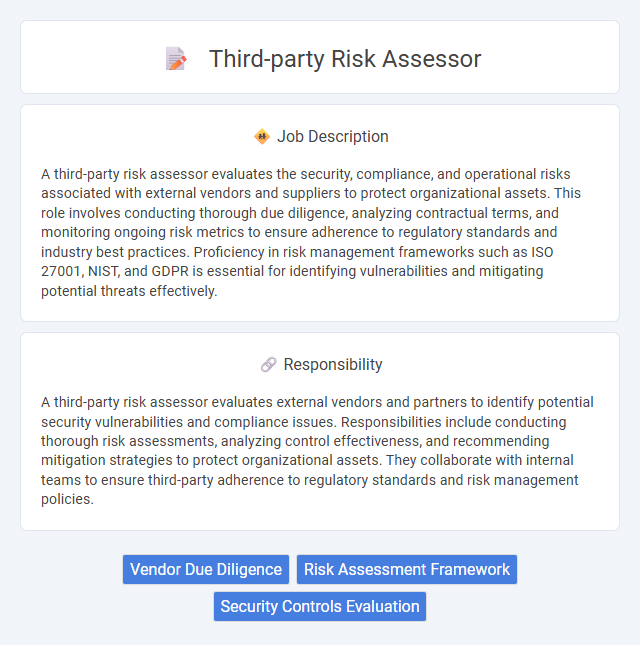
A third-party risk assessor evaluates the security, compliance, and operational risks associated with external vendors and suppliers to protect organizational assets. This role involves conducting thorough due diligence, analyzing contractual terms, and monitoring ongoing risk metrics to ensure adherence to regulatory standards and industry best practices. Proficiency in risk management frameworks such as ISO 27001, NIST, and GDPR is essential for identifying vulnerabilities and mitigating potential threats effectively.
Individuals with strong analytical skills and attention to detail are likely suitable for a Third-party risk assessor role, as the job demands thorough evaluation of external vendors and compliance risks. Candidates comfortable with regulatory environments and possessing effective communication abilities probably adapt well to managing stakeholder relationships and reporting findings. Those who prefer dynamic problem-solving and can handle pressure from shifting risk landscapes may experience higher job satisfaction in this position.
Qualification
A Third-party risk assessor must possess strong analytical skills and a comprehensive understanding of regulatory compliance frameworks such as ISO 27001, SOC 2, and GDPR. Certification in risk management or cybersecurity, such as CISSP, CRISC, or CISA, significantly enhances qualification credibility. Proven experience in evaluating vendor security postures, performing risk assessments, and mitigating third-party risks is critical for effective job performance.
Responsibility
A third-party risk assessor evaluates external vendors and partners to identify potential security vulnerabilities and compliance issues. Responsibilities include conducting thorough risk assessments, analyzing control effectiveness, and recommending mitigation strategies to protect organizational assets. They collaborate with internal teams to ensure third-party adherence to regulatory standards and risk management policies.
Benefit
Engaging a third-party risk assessor likely enhances an organization's ability to identify vulnerabilities posed by external vendors, thereby reducing the probability of security breaches. This role probably streamlines compliance efforts by ensuring that third-party services meet industry standards, which can lead to improved regulatory adherence. There is also a strong chance that utilizing such expertise optimizes risk management strategies, potentially saving costs related to data loss or legal penalties.
Challenge
Third-party risk assessors likely face the challenge of evaluating complex vendor networks where transparency may be limited, increasing the difficulty of accurately identifying potential risks. The role probably requires balancing thorough risk analysis with maintaining business relationships, which can create conflicting priorities. Assessors might also encounter rapidly evolving regulatory requirements, necessitating continuous learning and adaptation to ensure compliance.
Career Advancement
A Third-party risk assessor plays a crucial role in identifying and mitigating risks associated with external vendors, enhancing organizational security and compliance. Mastery in risk analysis, regulatory frameworks, and vendor management opens pathways to senior roles such as Risk Manager, Compliance Officer, or Chief Risk Officer. Continuous professional development and certifications like CRISC or CISA significantly boost career growth opportunities in this increasingly vital field.
Key Terms
Vendor Due Diligence
A Third-party risk assessor specializing in vendor due diligence evaluates the reliability, security protocols, and compliance standards of external suppliers to mitigate potential risks to the organization. This role involves conducting comprehensive assessments of vendor financial stability, cybersecurity measures, and regulatory adherence to ensure alignment with corporate risk management policies. Regular vendor audits and risk scoring systems are utilized to maintain continuous monitoring and safeguard enterprise operations from third-party vulnerabilities.
Risk Assessment Framework
A Third-party risk assessor specializes in evaluating external vendors and partners to ensure compliance with an organization's Risk Assessment Framework, identifying potential vulnerabilities and regulatory gaps. This role involves analyzing vendor security controls, assessing third-party data privacy measures, and quantifying business impact through structured risk evaluation methodologies. Implementing and maintaining a robust Risk Assessment Framework enables proactive mitigation of operational and cybersecurity risks associated with third-party relationships.
Security Controls Evaluation
Third-party risk assessors specialize in evaluating security controls to identify vulnerabilities and ensure compliance with industry standards such as ISO 27001 and NIST. They conduct thorough audits of external vendors' cybersecurity measures, assessing access management, data protection protocols, and incident response plans. These evaluations help organizations mitigate risks from external partnerships, reducing potential exposure to data breaches and regulatory penalties.
 kuljobs.com
kuljobs.com